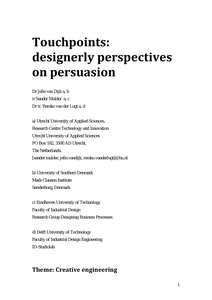Ambient Intelligent environments are interactive environments that sense human behaviour and can respond intelligently. This workshop explores how interactive environments can be designed with persuasive quality, influencing human experience and behaviour. The workshop follows a research-through-design approach where practise-relevant insights are gained while designing. The focus will be on intuitive and rational decision-making, the role of aesthetics in persuasion, social and spatial influences on persuasion and the ethics of designing for persuasion.
DOCUMENT

It has been established that normative social influence can be used effec-tively in persuasive technology. However, it is unknown whether the application of more social pressure makes it more effective. To test this hypothesis, a quantitative experiment was conducted on the online social network Facebook. Although evidence to support the hypothesis was found, it cannot be concluded from this experiment that more intense persuasion is more effective, when utilizing normative social influence in persuasive technology.
DOCUMENT

Our approach builds on both the design traditions of participatory design and embodiment. We attempt to connect these traditions to the existing body of knowledge on persuasion. First we describe some basic theoretical concepts and infer how they influence persuasive design. Then we present a basic framework with which we intend to address the different abstraction layers involved. Finally, we discuss the principal differences and meeting areas between the disciplines of design and communication, ending up with some considerations for a persuasion toolbox that is intended to help communication professionals and designers effectively design behavior change interventions that fit the messy lives of people in the real world
DOCUMENT
